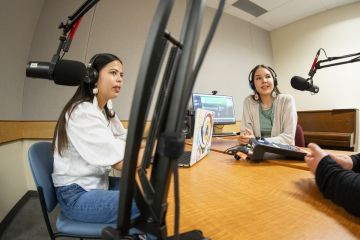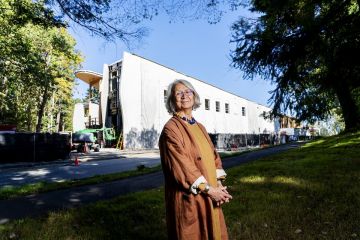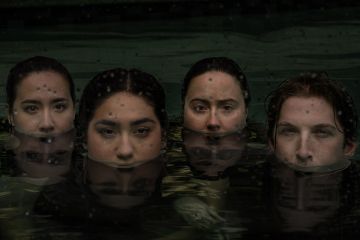President Jamie Cassels makes submission for Indigenous Law program to committee
University of Victoria President Jamie Cassels made a presentation before the House of Commons standing committee on finance meeting in Richmond today. Cassels’ appearance before the committee of MPs, part of government pre-budget consultations, was to consider UVic’s submission for financial support to create the proposed Indigenous Law Program and the Indigenous Legal Lodge within the Faculty of Law.
Val Napoleon, who leads the Indigenous Law Research Unit in the Faculty of Law, joined Cassels in appearing before the committee.
UVic announced in November 2016 a proposal to establish an Indigenous-Canadian common law degree program that would be the first of its kind in Canada.
The text of Cassels’ remarks is attached.
-- 30 --
Remarks to the House of Commons’ Standing Committee on Finance
Professor Jamie Cassels, QC
President and Vice-Chancellor
University of Victoria
October 4, 2017
CHECK AGAINST DELIVERY
Thank you Mr. Chair. It is our pleasure to meet with your Committee. On behalf of the University of Victoria, I welcome the opportunity to speak about our proposed Indigenous Law Program and how it directly responds to the focus of this committee.
In my remarks this morning, I am going to outline what it will take to deliver on a ground-breaking program at the University of Victoria and the impact that it could have across the country and, indeed, around the world.
The University of Victoria is one of Canada’s premier research and teaching universities, educating more than 22,000 students a year. In particular, UVic is a national leader in closing the educational gap for Indigenous students. Over the last decade, our Indigenous student population has tripled and it continues to increase with each passing year, with five per cent of our student body identifying as Indigenous.
Right now, Canada and Indigenous peoples are working to build the elements of a nation-to-nation relationship and establish a new era of respect and reconciliation. The Government of Canada and Indigenous peoples expect that, by restoring their relationship and building robust institutions, they will promote effective governance and economic growth.
UVic shares the government’s commitment to reconciliation and the nation-to-nation relationship. Just last month we launched our most comprehensive Indigenous Plan ever, which outlines how UVic strives to integrate and honour Indigenous cultures, histories, beliefs and ways of knowing and being into our strategic planning, curriculum, teaching, research and operations.
We believe that Indigenous peoples must share in a social, cultural and economically viable future for all of us. Our programs of education and research focus on Indigenous language revitalization, culture, and social and economic capacity building.
Today, I want to speak specifically about our proposed Indigenous Law Program. Like other laws, Indigenous laws are about citizenship, governance, managing conflict, and interacting with other peoples beyond one’s own society. As Indigenous peoples increasingly exercise jurisdiction over their lands, resources, and affairs, they draw upon their own legal traditions and principles of social order.
The Indigenous Law Program would be composed of two key components that respond to these needs.
First: A four-year dual-degree in which students would acquire degrees in both the Common Law and Indigenous Legal Orders. Students will participate in practical, hands-on learning in field schools and work on Indigenous territories across the country, learning from Indigenous experts and contributing to the operation of Indigenous institutions. They will gain the skills to build legitimate processes that draw upon Indigenous traditions to translate across Indigenous and non-Indigenous legal, social and economic structures.
Second: The Indigenous Legal Lodge – a national forum for critical engagement, debate, learning, public education, and partnership on Indigenous legal traditions and their use, refinement, and reconstruction today. This would both house the educational programs and be a national gathering place for professional and community education on Indigenous legal traditions, and a research institute promoting rigorous engagement Canada-wide.
Indeed, it would be an institution of international significance, as countries worldwide are struggling with similar challenges in how to recognize and work with Indigenous legal orders. It will serve as a global centre of excellence for understanding, developing, and deploying Indigenous legal institutions, including the structures that can build and sustain healthy relationships between Indigenous peoples and states.
The program will be led by some of Canada’s finest Indigenous scholars and leaders, including Dr. Val Napoleon, who joins me here today.
Dr. Napoleon leads the Indigenous Law Research Unit in the Faculty of Law, which has worked with over 40 communities across Canada to create robust legal resources and tools, processes, practices, and institutions grounded in Indigenous legal traditions.
The University of Victoria is requesting financial support from the federal government to build the Indigenous Legal Lodge, an iconic and culturally appropriate facility and a marquis legacy investment fulfilling the Calls to Action from the Truth and Reconciliation Commission.
Both the program and the Lodge directly fulfil the TRC’s Call to Action 50, which calls for the establishment of institutes of Indigenous law. They support the Government of Canada’s commitment to a nation-to-nation relationship, advance the Ten Principles respecting the Government of Canada’s relationship with Indigenous Peoples, and helps to provide substance to the implementation of the UN Declaration on the Rights of Indigenous Peoples.
By supporting this proposal, the government would also be responding to Indigenous Peoples from across Canada who have expressed their support for the program. This support culminated in a resolution passed unopposed and by a consensus of the Chiefs-in-Assembly. At the 2017 AGM of the Assembly of First Nations, which urges the Government of Canada to, “fund the establishment of the University of Victoria’s Indigenous Legal Lodge as a foundation for understanding, researching, and deliberating upon the nature of Indigenous legal systems and their continued use today.”
Reconciliation is intrinsically dependent upon the recognition of the rights and traditions of Indigenous peoples. This program furthers reconciliation by recognizing and supporting the legal orders on which self-government depends – indeed which form the very fabric of Indigenous nationhood. In doing so, it lays the foundation for a new era of economic partnership and resource development by contributing to robust governance structures, anchored in the communities’ own law. It lays the foundation for mutual respect and shared prosperity for Indigenous peoples and all Canadians.
Thank you for this opportunity and both Dr. Val Napoleon and I are available for questions.
Media contacts
Paul Marck (University Communications + Marketing) at 250-721-6246 or pcmarck@uvic.ca
In this story
Keywords: Indigenous, government, law, administrative
People: Jamie Cassels




